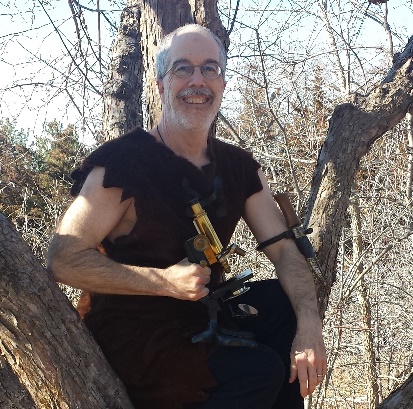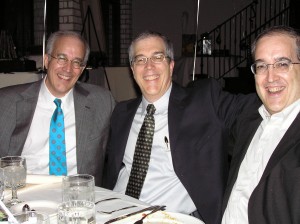PrimevalGeoPhysicist, PaleoPathologist, and PrimalProgrammer captured a few years back at Tribal Rite celebrating 50th Birthday of PrimevalGeoPhysicist. PrimalProgrammer wrote recently with a question:
First I’d like to find out: What is a “Paleo” Diet?
I haven’t really read up on it. Is it wandering through forests, picking up walnuts and strawberries off the bushes, hunting for food, and having a great time with the guys and fermented honey booze back at the caves? (I’m visualizing the starting part of 2001: A Space Odyssey here.)
What’s new about the PaleoDiet, especially compared to Atkins / South Beach high protein, very low carb diets?
Great question, PrimalProgrammer!
The term “paleo” probably started up for real with Dr. Loren Courdain, a professor up at Colorado State University. Another early leader in the “paleo” movement was Robb Wolf, a biochemist. Yet another is Mark Sisson, who has a popular website called Mark’s Daily Apple which has massive amounts of information. Mark uses the term “primal” instead of “paleo.” From there it goes on and on; a podcast I listen to claims that “paleo” is one of the highest ranked Google search terms.
In summary, “paleo” means “old.” With diet, it usually refers to “Paleolithic”, or “old stone age.” The hypothesis is that humans in the Hunter-Gatherer stage were tall, strong, and healthy, eating animals, wild plants, seafood, essentially things that can be hunted or gathered. The hypothesis continues that since our ancestors evolved eating this way, the healthiest way to eat is…this way. So the elk hunting trips PrimevalPhysicist, PrimalProgrammer, and PaleoPathologist went on back in the 70’s were spot on!
Since people can’t help dividing themselves up and arguing bitterly based on small differences, there are now a bunch of “paleo” tribes. Some allow milk, some don’t. Some allow eggs, some don’t. Virtually all paleo tribes ban gluten and in PrimalProgrammer and PaleoPathologist’s family, where the tribal chief came down with Celiac disease in the late 60’s, cutting gluten is probably a good idea! Oh, most Paleo’s also ban refined sugar but there is all kinds of disagreement about starches like sweet potatoes, regular potatoes, and other “tubers.” And virtually all paleo’s also discourage the cheap seed oils (corn, soybean, vegetable oils, canola, margarine) that food technology started producing in the 20th century.
The major problem PaleoPathologist sees with the classic Paleo approach is the difficulty of determining how humans actually ate 50,000 years ago. Nomads leave crummy fossil evidence which requires a lot of extrapolation. Unless we can recruit a Time Lord like Dr. Who, or channel Stanley Kubrick, it will be difficult or impossible to demonstrate precisely what paleolithic humans actually ate, and further, those in warm coastal Africa would have eaten entirely different foods from those living in Europe at the advancing edge of a glacier.
So the purist “paleo” evolutionary approach is interesting, emotionally appealing (who doesn’t want, on some level, to be a caveman?) and makes good hypotheses but can’t really be proven, at least right now.
Another approach was a dentist named Weston A. Price, an interesting man who noticed that his American patients in the 1930’s had crummy teeth but people in Africa and Asia had great teeth. (Hey, the guy was a dentist. He probably thought the human body was “Teeth, and Tooth Support Systems!”)
As an aside, years ago PaleoPathologist and PaleoPathologistMate sent their second daughter, age 4, to a “gifted and talented” program where they had a session on teeth. She returned home brushing her teeth until her gums bled, and told us very seriously that “Did you know the Teeth are the most important part of the body?” PaleoPathologist, a normal 33 year old male, immediately thought of a different candidate (which actually hasn’t really changed over the past 27 years!) but he wisely kept his big mouth shut.
Anyway, back to the story. Price went on a worldwide quest to see if he could figure out what was going on, and basically found that humans do better eating nutrient-dense, wild foods (plants, animals, seafood.) He further found that the primitives had fewer of the modern “degenerative” diseases and wrote a book about it. There is now a Weston A. Price Foundation that looks into good solid nutrition. Surprise, surprise–many of Price’s findings are similar to the “paleo/evolutionary” approach: variety of plant and animal foods, fermented foods, no refined sugar, etc.
Another investigator using a similar ethnic approach is Dr. Catherine Shanahan in her book “Deep Nutrition.” She looked at traditional cuisines around the world and derived her “four pillars” of healthy cuisine: meat on the bone (with its fat intact, bone broth, etc); organ meat (by the way PaleoPathologist loves his elk liver!); fresh, sprouted, and fermented plants; and finally, fresh seasonal food.
As you have mentioned, there is another approach, a more biochemical approach. Dr. Robert Atkins, a cardiologist in New York, read widely and came across some old research on very low carbohydrate diets which were used in England in the 1850’s, popularized by William Banting. Low carb diets also were used in type I diabetes before insulin was discovered and produced, and low carb diets also provided relief from epilepsy before Dilantin was discovered. Atkins found that his overweight patients lost weight with less discomfort than the newly popularized “low fat diets” when they ate moderate protein, very low carbohydrate (starting with 20 gm/day) and a fair amount of fat. Atkins was PILLORIED for this in the medical community; people just like PaleoPathologist (to his everlasting shame…) really believed that because arterial plaques had fat in them, that you should eat less fat. Atkins of course turned out to be correct. And what was in his diet? Plants, animals, seafood, butter and olive oil, avoid sugar, starches. Sounds familiar, doesn’t it?
So in summary Paleo, Weston A Price, and Atkins base their diet recommendations on different starting hypotheses, but end up in pretty much the same place. PaleoPathologist thinks that probably the Atkins approach has the most direct evidence, since it has been in the crosshairs of multiple studies trying unsuccessfully to prove how awful it is. Rather than giving in to tribalism, however, virtually all of us can improve our health by following some variation of lower carb, no sugar, low to no wheat, MODERATE (not high) protein, and lots of good fats. If you really need to lose a lot of weight, nothing has beaten a very low carb Atkins-style diet.
So what do you think out there, Primal Programmer and others? Is this a fair summary?


I found this very useful. I especially like your final paragraph. When I asked my internist wife about the Atkins diet, she said people on that diet often have high cholesterol. Do you think that is a concern?
She needs to look up the A-Z trial back in about 2008. Try here. The legend that Atkins increases the risk of heart disease has been around forever. Atkins was a cardiologist for goodness sake. People on low-carb diets almost predictably raise HDL and lower triglycerides and the HDL/Trig ratio is an excellent predictor of risk. It is true that a percentage of people raise total cholesterol and LDL on low-carb, especially during the rapid weight loss phase when they are mobilizing a lot of fat but I’ve not found any evidence that heart disease rises in low carbers.
Back in the first Atkins fad in early 2000’s, I had a conversation in the doctor’s lounge with a cardiologist who told me he put all of his high cholesterol patients on…Atkins! He said all but one had lowered their cholesterol.